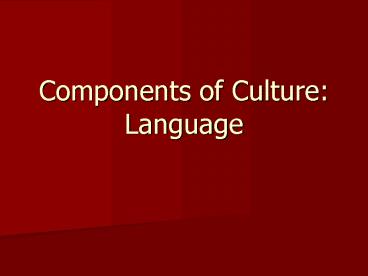Components of Culture: Language - PowerPoint PPT Presentation
1 / 17
Title:
Components of Culture: Language
Description:
What do these 'Kiwi' expressions mean? 'Spit the dummy' 'I'm stuffed! ... 'A bird in the hand is worth two in the bush.' 'Cleanliness is next to Godliness. ... – PowerPoint PPT presentation
Number of Views:193
Avg rating:3.0/5.0
Title: Components of Culture: Language
1
Components of CultureLanguage
2
Language Defined
- A set of symbols that expresses ideas and allows
people to think and communicate with each other. - Can be verbal or nonverbal.
3
Even within one language, confusion is common.
- How many interpretations can you think of for
these sentences? - Theres a fork in the road.
- He shot his mouth off.
- My neighbor had her second car stolen.
- The artist painted me on the porch.
4
These are actual headlines taken from the
newspaper.
- Soviet ships collide, one dies.
- Obesity study seeks larger test group.
- Safety experts say school bus passengers should
be belted. - Squad helps dog bite victim.
- Drunk gets nine months in violin case.
- Police begin campaign to run down jaywalkers.
5
Can you answer these questions?
- Why are they called stands when theyre made
for sitting? - Why are a wise man and wise guy opposites?
- Why it called after dark when its really
after light? - Why do fat chance and slim chance mean the
same thing?
6
Understanding language becomes even more
challenging for non-native speakers.
- What do these Kiwi expressions mean?
- Spit the dummy
- Im stuffed!
- Do you have a torch?
- Are you in college?
- Hes had to do some hard yakka!
- Want some shark and tatties?
7
Language can also be a source of discrimination.
- Language and Gender
- The use of the word man in words like chairman
and mankind. - Use of the pronouns he and she affects
thinking about gender. For example, nurses and
secretaries are usually referred to as she.
8
Language can also be an expression of racial and
ethnic discrimination.
- Some words have more than one meaning and create
negative images, such as blackhearted or a
black mark on your record. - Negative words can also become associated with
groups, such as referring to Native Americans as
savages.
9
How important is it for members of one country to
speak the same language?
- How should a society balance respect for
individual cultures and a need for unity?
10
Language, Race Ethnicity
- The percentage of Americans who do not speak
English at home has continued to increase over
time.
11
Language and Culture
- Language is an important way to transmit culture.
- Through language children learn
- about their cultural identity.
12
Proverbs are one example of how culture is
conveyed through words.
- A bird in the hand is worth two in the bush.
- Cleanliness is next to Godliness.
- The early bird gets the worm.
What do these proverbs say about American culture?
13
What do these proverbs mean?
- Lower your voice and strengthen your argument
(Lebanese proverb) - "When the brothers fight to the death, a stranger
inherits their father's estate. (African
proverb) - Flies never visit an egg that has no crack.
(Chinese proverb)
14
African Proverb
- Abafugibwa ngabo atannagikwatamu ye agitenda
obwangu.
- Those who are ruled are like the shield who
never got hold of it, thinks it light. Those who
don't rule think ruling is easy.
15
Maori Proverb
- E moa i tangata ringa raupa.
- Marry a man with blistered hands.
16
Mexican Proverb
- Anda tu camino sin ayuda de vecino.
- Walk your own road without the help of a
neighbor.
17
To Summarize
- Language is a set of symbols, which allows people
to communicate with each other (both verbal and
nonverbal) - Language can be a source of discrimination.
- Language is a common source of confusion, even
among members of the same culture. - Language is a vital means of transmitting culture.































